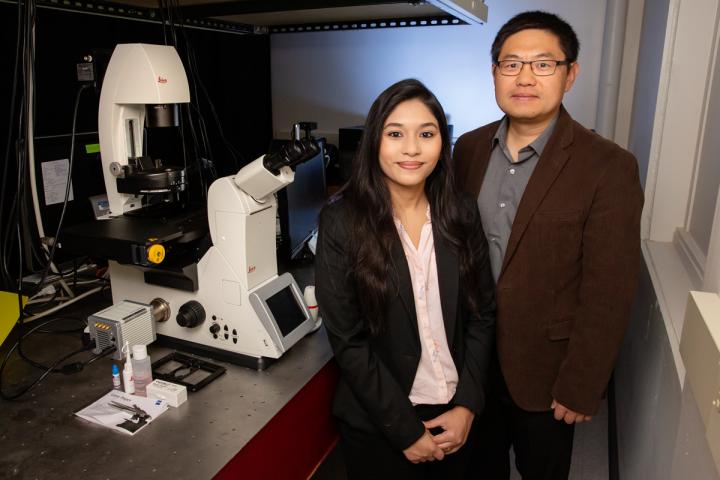
Credit: Photo by L. Brian Stauffer
CHAMPAIGN, Ill. – Researchers report they have developed a new technique that uses light to control the lifetime of a protein inside the cell. This method will allow scientists to better observe how specific proteins contribute to health, development and disease.
Previous techniques for controlling protein levels involved adding chemicals that degrade specific proteins, said University of Illinois biochemistry professor Kai Zhang, who led the new research. Using light, a method called optogenetics, is a more efficient, nontoxic way to control protein levels, Zhang said.
In earlier optogenetics approaches, scientists modified specific proteins so that shining a light on the cell caused the proteins to break down, Zhang said.
“We wanted to develop a system where you can stabilize – rather than degrade – a target protein using light,” said Payel Mondal, a graduate student in the Zhang lab. “This can have applications in cancer where you want to stabilize a cancer inhibitor.”
Proteins are activated in cells in different ways. The researchers wanted to ensure that their method would work on any protein of interest.
The team’s new technique, called GLIMPSe, involves attaching a short peptide sequence, called a degron, to the target protein that signals the cell to degrade it. Light triggers the cell to remove the degron, thus rescuing the protein from degradation. This technique allows scientists to study what happens when a protein is present or absent in the cell, or when it is present at lower and higher levels.
The researchers modified two kinds of proteins: a kinase and a phosphatase.
“If you activate the kinase, it will direct the cell to differentiate into a neuronal cell line,” Zhang said. “If you activate the phosphatase, it will block that differentiation.”
“We demonstrated that the stability of two different classes of proteins can be controlled using light,” Mondal said. “We saw protein stabilization within 30 minutes of using the light.”
“One of the limitations of this system is that once the protein is rescued, we have no further ability to control its levels,” Zhang said. “Eventually, the cell will degrade the protein.”
The researchers are working to develop new techniques to further extend their control.
The findings are the result of a long-term collaboration with Jing Yang, a University of Illinois comparative biosciences professor and a co-author of the paper.
“We started looking at embryonic development and Professor Yang had a very detailed study of how the degron worked,” Zhang said. “By bridging embryonic development with synthetic biology, we created new tools.”
Zhang’s team is studying how to control protein stability after its optogenetic rescue and how to use this technique to study embryonic development.
The new findings are reported ACS Synthetic Biology.
###
The National Institutes of Health supported this work.
Editor’s notes:
To reach Kai Zhang, call 217-300-0582; email [email protected].
The paper “Repurposing protein degradation for optogenetic modulation of protein activities” is available online and from the U. of I. News Bureau.
Media Contact
Ananya Sen
[email protected]
217-333-5802
Original Source
https:/
Related Journal Article
http://dx.




